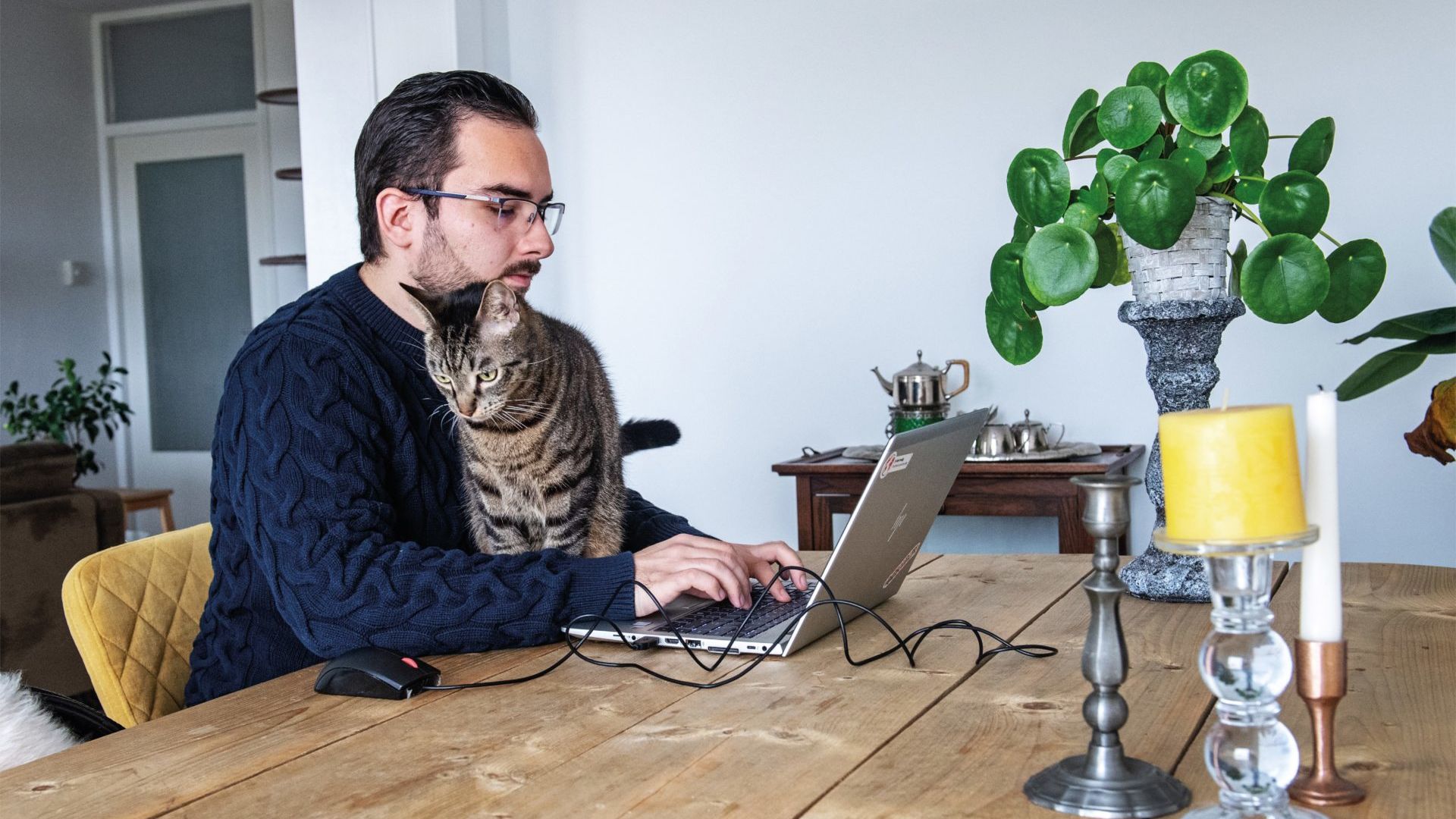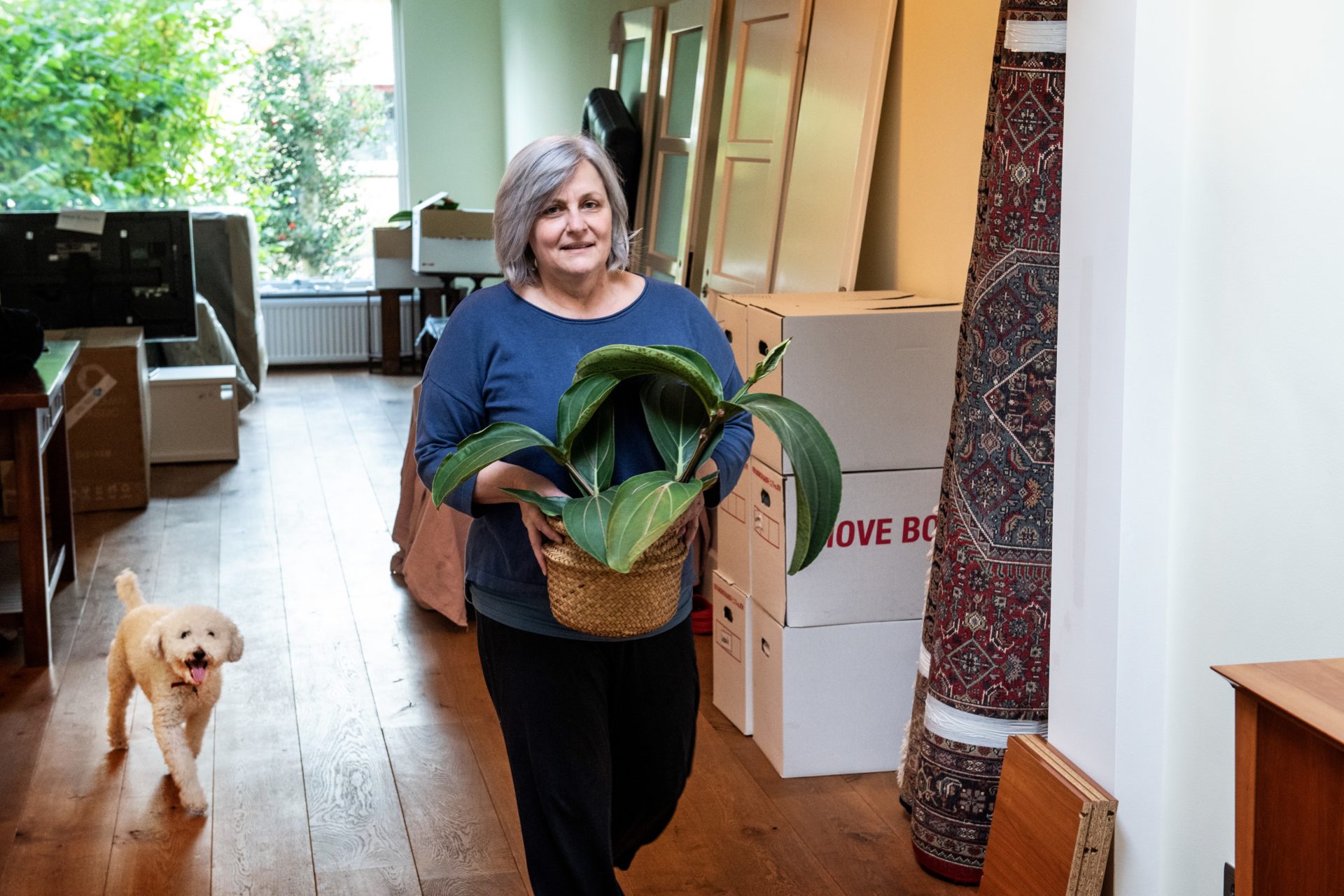For these internationals, housing in Nijmegen was a bridge too far
-
 Okan Mollov currently lives in Vianen. Photo: Bert Beelen
Okan Mollov currently lives in Vianen. Photo: Bert Beelen
The housing crisis is particularly hard for international employees and students. They don’t have the knowledge required to navigate the housing market and often hear ‘no internationals’. This is why Professor Amalia Arvaniti moved to Oss, marketing officer Okan Mollov has settled in Vianen, and Psychology student Hannah Landbauer commutes every day from Eindhoven to the Radboud campus.
‘I’m afraid we can’t meet in my house’, emails Amalia Arvaniti. ‘KPN was too quick to disconnect our internet connection so I can’t work from home anymore. Let’s meet at the Erasmus building.’
Professor of English Language and Linguistics, who comes from Greece, lives with her husband and son in Elst. Not for long, though, since they have bought a house in Oss. At this very moment, painters and plumbers are at work there. In Elst, the family has started to pack their belongings. While continuing to work, and, in the case of the Professor, making time for an interview with Vox. ‘Clearly, we’d have preferred to buy a house in Nijmegen,’ she sighs. ‘But we couldn’t find anything.’
Her search for a house began in the summer of 2020 in Canterbury, England, where Arvaniti lived with her family when she accepted a job at Radboud University. ‘At first, we looked for a rental. We weren’t allowed to buy anything in the Netherlands because my husband’s American. He first had to organise a residence permit.’
 All right, a rental house then. But that turned out to be quite a challenge. Pickings on the private market were slim and the family had a small dog. ‘Many landlords don’t allow pets. And most houses were already gone by the time the ad appeared online.’ Via Zoom (due to the pandemic), she attended a number of house viewings. The only house she qualified for was a semi-detached in Elst, and only because someone tipped her off before the house appeared on Funda. From her laptop in the UK, she said ‘yes’.
All right, a rental house then. But that turned out to be quite a challenge. Pickings on the private market were slim and the family had a small dog. ‘Many landlords don’t allow pets. And most houses were already gone by the time the ad appeared online.’ Via Zoom (due to the pandemic), she attended a number of house viewings. The only house she qualified for was a semi-detached in Elst, and only because someone tipped her off before the house appeared on Funda. From her laptop in the UK, she said ‘yes’.
‘We didn’t know what to expect as we drove into the neighbourhood in August. But we were pleasantly surpri- sed. We liked everything about Elst: it was green, we had a lovely garden, and the neighbours were friendly.’ But Arvaniti didn’t want to keep renting. Ultimately, she wanted to buy a house, which is, after all, a really good investment. She emphasises what a blessing it is that you can even get a mortgage in the Netherlands.’ In England, banks don’t lend you money unless you can prove that you’ll be able to repay it all before you retire.’
After six months, her husband got his residence permit and the couple enthusiastically dived into the Nijmegen housing market, only to discover that it was a vipers’ nest. They didn’t even get a chance to attend most viewings, and the few times they bid on a house, someone immediately bid higher. Unfortunately, there was no one to help the newcomers navigate this bizarre housing world. ‘We soon discovered that we stood no chance in Nijmegen. A great pity, as we’d have loved to live in the city, close to the University and close to all those great little restaurants.’
The radius around the City on the Waal in which they were searching grew wider and wider. In the meantime, prices continued to rise. Waiting any longer would not be to their advantage. This was when the house in Oss appeared. Also a semi-detached, with a garden, a garage and wooden floors. And less than €400,000. ‘The funny thing was that the estate agent pointed out to us that it was a neighbourhood with lots of foreigners. We’re also foreigners, but somehow I don’t think that was what he meant.’
Her son, who goes to an international school, can commute via a direct train connection from Oss to Arnhem. And Arvaniti can commute to the University reasonably easily, even though it does involve a bicycle, train and bus ride.
Stress
Fifty kilometres further to the North West lives Okan Mollov. The Radboud University Marketing & Communications Officer – he organises virtual open days – settled this year in Vianen, near Utrecht. His laptop is open on the dining-room table. ‘Luckily I don’t have to be on campus every day,’ he says. From door to door, it’s a two-hour commute. He too would have loved to live in Nijmegen. But he couldn’t find anything. ‘Nijmegen isn’t very open for internationals,’ he says, as he strokes his cat Gijs.
Mollov, half-Bulgarian and half-Turkish, came to Radboud University as a pre-Master’s student. In an attempt to find a place to live, he joined many different Facebook groups. To his great frustration, most ads specified ‘No internationals’. He previously lived in Leeuwarden and Amsterdam, where he found the atmosphere to be a lot more international. ‘In the end, I found a room on Kamernet: a studio in someone’s home in Ressen.’
Ressen? ‘Near Bemmel.’ He shrugs his shoulders apologetically. It was really expensive too: €670. And there was no Wi-Fi. But what else was he supposed to do?
He had already registered at the International Office (officially: Student Life and International Mobility), where he was told that a room had become available via an intermediary, but he was not allowed to see it. He had to sign a contract based on photographs alone. ‘That room cost €700 per month. I said that I found it strange that I couldn’t even visit the room. I’m sure they don’t behave like that with Dutch students. I didn’t want to take the risk.’
‘They said they couldn’t do anything for me’
Like Professor Amalia Arvaniti, he didn’t know anyone at the University who could help him find a place. He almost missed out on the studio in Ressen because the landlord gave him a contract in Dutch, which he sent to a friend to translate. ‘That took a while. By the time I contacted the landlord again, he said they wanted to rent the room to someone else. I was really stressed out, and asked the International Office for advice. But they said they couldn’t do anything for me.’
Mollov still gets angry about it. ‘There’s always something you can do. Even if it’s only listening.’ He believes that if you invite students from all over the world to Nijmegen, you should help them find accommodation. For years, he worked in the hotel sector. The hospitality that is inherent to this sector is something he really missed at the University. A lot of international students are offered a room via SSH&, but they are only allowed to stay in it for one year. After that, they are expected to find something else. ‘But how? There’s nothing. Or the ad specifies ‘no internationals’.’
Dedicated helpdesk
Concerning the practice of barring international students from Nijmegen student houses, Rector Han van Krieken was very clear at the latest Dies Natalis (anniversary of the University). He referred to it as an ‘extremely bad practice’. One that ‘… reveals a very nasty side of Dutch culture.’ Recently, the Rector announced that he is exploring the possibility for temporary student housing on the campus.
Arvaniti has lived in various places in the world. From friends in New York she knows that the University owns and rents out apartments. When she worked at the University of California in San Diego, she and all other employees were offered a low-interest loan to help them buy a house. ‘My colleagues in Nijmegen were more than willing to help, but most of them had bought their houses years ago, and they were just as lost in the current housing market.’ She believes that a good start would be a dedicated helpdesk, manned by Radboud staff with knowledge of the housing market who could help new employees to find a house.
This kind of helpdesk could perhaps have prevented Okan Mollov – after an interim stop in Amsterdam (‘where it was surprisingly easy to find accommodation last year) – from settling in a flat in Vianen. ‘My partner already lived here,’ he explains as we share coffee and biscuits. ‘Now we live together.’
The Marketing & Communications officer is happy with the light, spacious apartment, although he would have preferred to build his social life in the city where he obtained his Master’s diploma last October and where he now works. ‘The University should become more involved in this problem.’
Fake ad
Hannah Landbauer, who prefers to appear under a fictitious name (her real name is known to the editors), also came up against a brick wall at the International Office. Last spring, the student from Germany enrolled in a Psychology programme at Radboud University. At the time, she was studying in Berlin. She immediately joined various Facebook groups. Since her boyfriend lived in Eindhoven, she temporarily moved in with him. ‘As a result, I already had a Dutch address, which meant I didn’t qualify for a room for internationals from SSH&,’ she explains via Zoom.
But Landbauer was set on moving to Nijmegen. She began her house search in April; it’s now November, and she still hasn’t found anything. She’s kept track of how often she’s responded to ads. ‘In the past months, I’ve sent out 230 emails and responses. I was invited to four viewings. Every time, they chose someone else.’
‘I miss the social life in Nijmegen’
Landbauer also experiences discrimination on the student room market. Ads are more likely than not to include the phrase ‘no internationals’. ‘The other day, I responded to a room that was open to internationals. They informed me that they’d received over two hundred responses. Ten candidates were invited for a viewing.’
It makes Landbauer feel desperate. So desperate that she recently fell for a fake ad. It concerned a room in the city centre. She was asked to transfer an advance payment of € 700. The keys would be sent to her by post. ‘The keys never arrived, of course, but I did lose my money.’
Next semester, her lectures will be starting at 9 a.m. two mornings a week, which means she will have to be on the bus at 5.45 a.m. How long will she manage to put up with this? ‘Because I live in Eindhoven, I can’t seem to make friends at whose place I could stay overnight. I miss the social life in Nijmegen.’
Landbauer is thinking about going back to Berlin if she doesn’t find a place in Nijmegen within a few months. It’s not because of the programme, which she really enjoys. ‘I’m clearly not the only person facing this problem. The University should do something about it, otherwise international students will get discouraged and leave.’
Professor Arvaniti hopes at least for more understanding for the situation of international students and employees. Starting with flexibility with respect to working from home, she says, also beyond the Covid-19 pandemic. ‘It’s unlikely I will be on campus every day.
It wasn’t my idea to go and live in Oss.’ She takes out the estate agent folder of her new 1970s house. A nice big kitchen, definitely something she wanted. She still has to practice pronouncing her new address. ‘Ruus-broec-gaarde … Wow! That’s hard to pronounce even for a Dutch person.’




